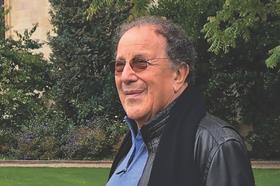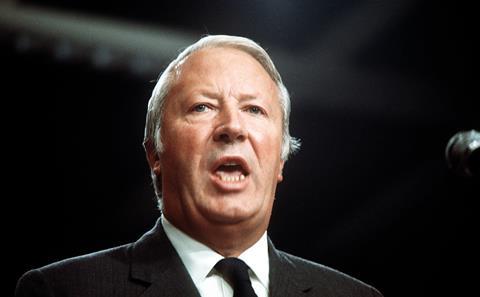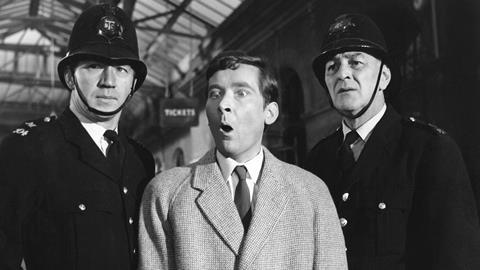It’s the early 1960s and Michael Simmons has moved the City firm he acquired from Jonathan Sumption’s father to new premises in Blackfriars. The champagne corks pop but rapid growth also brings its headaches
Life was very different after our move to John Carpenter House. We seemed to have far too much space, but this was to prove a blessing in disguise as we swiftly expanded.

One unexpected benefit of leasing the top floor was that we had access to a large flat roof with railings around. I persuaded a phone engineer to put a long wire on a phone extension. So, in the summer, if my work required long periods of concentrated study, I could be found in my sunbathing shorts on a folding chaise. This could be troubling for a client if we had to pause our phone conversation as a helicopter flew low overhead.
I was faced with reconstructing the firm, as none of my original partners proved good long-term bets.
Brian M was a great lawyer and remained with me for many years. If he had a fault, it was that he was too conscientious for certain clients who did not deserve such help and was easily manipulated by them.
I met Nick K when he was acting on the other side in an important defamation case. He was at a firm which specialised in music work, but the partners were only interested in the classical side. All the burgeoning rock and pop stuff was dumped on Nick. He brought it with him and it became a great growth area.
I personally found it a difficult area of practice, since the agents were often suspect while the artistes were innocents abroad. It was very easy to get into a situation where interests conflicted.
Ian S concentrated on property work and big clients. But he neglected the small fry, which at the time I considered wrong. Now, I’m not so sure. I had been trained to give all clients equal attention.
Lastly, there was Martin L whose father worked for a well-known nightclub and produced a string of dubious but interesting clients. He did not last long.
While I knew quite a lot about the law, the truth was I lacked the skills to lead and manage a fast-growing business enterprise. I suggested to my new partners that they help, but I cannot blame them for being uninterested.
The burden fell solely on me and naturally I made mistakes. No matter, the firm was still growing and the empty space I had taken over was now partitioned as working offices. I had long coveted the empty floor below but architect Hilary H (see the last instalment) eventually sublet it to Oliver C in the media business.
In one respect it turned out well, as Oliver became an important client as well as a good friend. But we would have to look elsewhere to expand further.
These were indeed the Swinging Sixties and I saw no reason why the practice of law could not be enjoyable. The American Bar Association were paying one of their periodic visits to London. I offered to give a party to receive a group of them. We held it on the roof. The waiters hired for the occasion were a little over-enthusiastic and were opening the champagne through the railings.
I asked one of our guests if it was easy to find our offices. ‘I just followed the trail of champagne corks,’ was his reply.
At the closing reception, a very senior American judge rose to thank his hosts. ‘I had not realised before that the English legal profession was so…’ – he paused interminably – ‘alcohol related.’
During the same conference, I sat on a panel at Grosvenor House to discuss the subject of lawyers advertising. After hearing all the wonderful things the Americans were doing, I rose with some humility to inform them that we were doing nothing at all, as advertising was completely banned.
We had some great successes but also some great failures. I was determined to develop our future partners from the articled clerks we were training. Some lasted the course but others didn’t.
Many years later, one of them rose to be senior partner at one of our top five firms. He had never worked directly with me.
I wrote to congratulate him and said facetiously how much further he would have risen if he had actually sat with me. He replied that the important lesson that he had learned from me was that the law could be fun.
With the benefit of much hindsight, I was a young man in too much of a hurry. I had much to learn. As well as seeking organic growth, I was determined to enlarge the firm by taking over smaller outfits, thus emulating the activities of some of my clients. I did not at that stage realise that there had to be a cultural fit.
I did not appreciate that all lawyers were not like me. The biggest disasters tended to be with sole practitioners, who found the change to a partnership model too difficult. They were accustomed to working and making decisions on their own, and could not adjust to what was in effect a corporate life.
In terms of work, I had an actor’s insecurity that every job would be my last. This was aggravated by the fact that, as a new firm, we did not have a large body of repeat clients. As a result, I found it difficult to refuse new clients and new work even when I felt in my gut that it would be better to let some other lawyer take on the problem.
We were gradually assuming a rather rudimentary form of specialisation. It was a bit like school where, as you get older, you give up certain subjects. I started by largely abandoning private client work unless the client was so important that they demanded the senior partner’s services and were prepared to pay for the privilege.
Having initially thought that I was going to be a tax lawyer like Anthony Sumption, I found that concentrating on making rich people richer did not appeal (although I am not politically on the left). Conveyancing soon followed, especially when I found that I had partners and lawyers who enjoyed that work. I personally did not. I found it a bit too formalised: rather like Scottish dancing.
I enjoyed the new challenges that corporate and commercial work had to offer. Running a business myself, I tried to think more like a businessman and less like a lawyer. I was pleasantly surprised when I found myself invited to be a non-executive director of certain client companies or, in effect, a consigliere (but not, I hasten to add, for the Mafia).
I still found the strategic side of litigation most interesting – if I could bring in others to handle the more tedious, formal aspects. My partners knew that they could pass on to me work and clients outside their usual scope, if this was particularly difficult and challenging. There was a good reason why my school reports said ‘easily bored’.
'Kenneth Williams had a compulsive need to entertain and our ribs would be aching. On each occasion I had to ask him to leave or no work would have been done that afternoon'
One aspect of practice that I enjoyed was converting a client who came to us for one particular type of work into a client for all purposes. Sometimes, they were so impressed this was no problem. At other times, the particular client viewed you as the lawyer for that specialist service only.
One example was the Master of my college. Throughout his long and distinguished career, he viewed me as his lawyer for defamation cases only following an early encounter, despite all my efforts to widen the scope of the services that I offered. By the time that he instructed me on the last case, I was no longer involved in that type of work at all. It didn’t seem to matter as he had confidence in me and I could tap in to the required specialist expertise within the firm.
When I eventually staggered to retirement after 50 years of practice, there was one aspect that I did not miss at all: the constant requirement to stimulate cashflow. Whether as sole proprietor or equity partner, I encountered the nagging need to have enough money in the bank at all times to pay salary, wages, rent and all other necessary outgoings. That consideration coloured everything else affecting private practice.
Chivvying one’s partners and lawyers to bill, take money on account and chase the clients for payment is a thankless but essential task. Of course, as the firm grows, part of that work can be delegated to credit controllers (and today to computers), but the buck stops at the top.
I knew a senior partner who had the obligatory photo of his wife and children on his desk – but it faced him rather than the client to remind him of the hungry mouths he needed to feed.
Coping with growth was a problem that I was eternally trying to solve. After about six years, we were bursting at the seams at John Carpenter House. There was no further room available. We were enjoying the benefit of rent now well below the market rate.
I was temperamentally reluctant to turn away new work and clients, so we took an additional suite of offices up the road at Tudor Street. Splitting the firm into two was very inefficient, but it could not be helped in the short term. Certain departments were moved out and I found myself dealing with a problem of morale, as they considered themselves Cinderellas.

Still, we had space to do something that I had long wanted, and was now allowed, to do by the relaxation of the professional marketing rules: establish a boardroom with kitchen attached, where we could entertain clients and others.
This proved a great success, particularly by mixing and matching certain people. The cooking was done by Cordon Bleu chefs who were hired for the weekly occasion.
One disaster was narrowly averted. I realised that the chef for the day was a Lady (literally), who was the estranged wife in a bitterly contested divorce from a well-known client who was soon to arrive as my lunch guest. A very hasty call to the agency was made and a substitute chef took over.
I met Edward Heath, our former prime minister, at a party and had an interesting talk with him. His personal assistant was also there. I asked her if Mr Heath would like to come to lunch with us. ‘Ask him yourself,’ was her reply.
I did – but I had no idea of the difficulties that would ensue. As a former minister for Northern Ireland, Edward Heath was on the IRA’s hitlist. So we had City of London Police marksmen on every roof around us and a big bill for sandwiches to feed them.
The star guest of all times was the actor and comedian Kenneth Williams, a client of the firm. He had a compulsive need to entertain and our ribs would be aching. On each occasion I had to ask him to leave or no work would have been done that afternoon.
As far as the firm was concerned, the acorn was growing into a very sturdy oak tree.
































1 Reader's comment